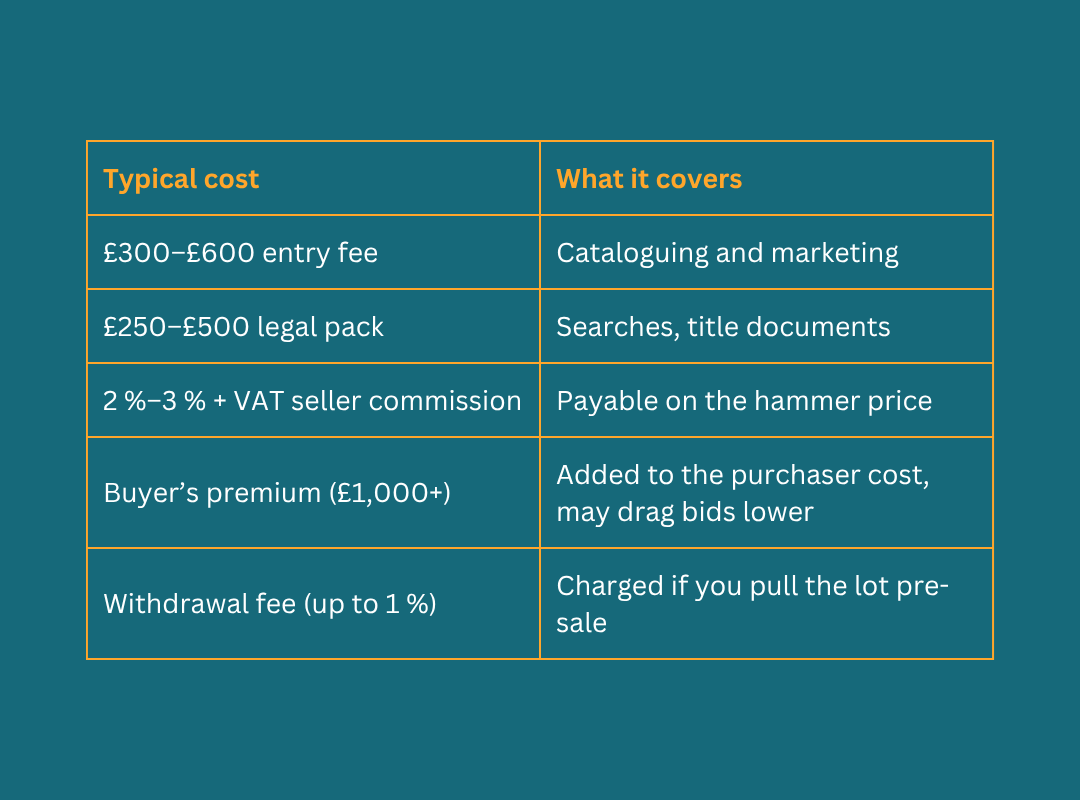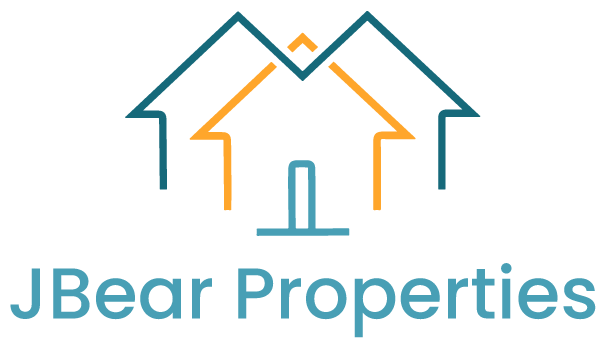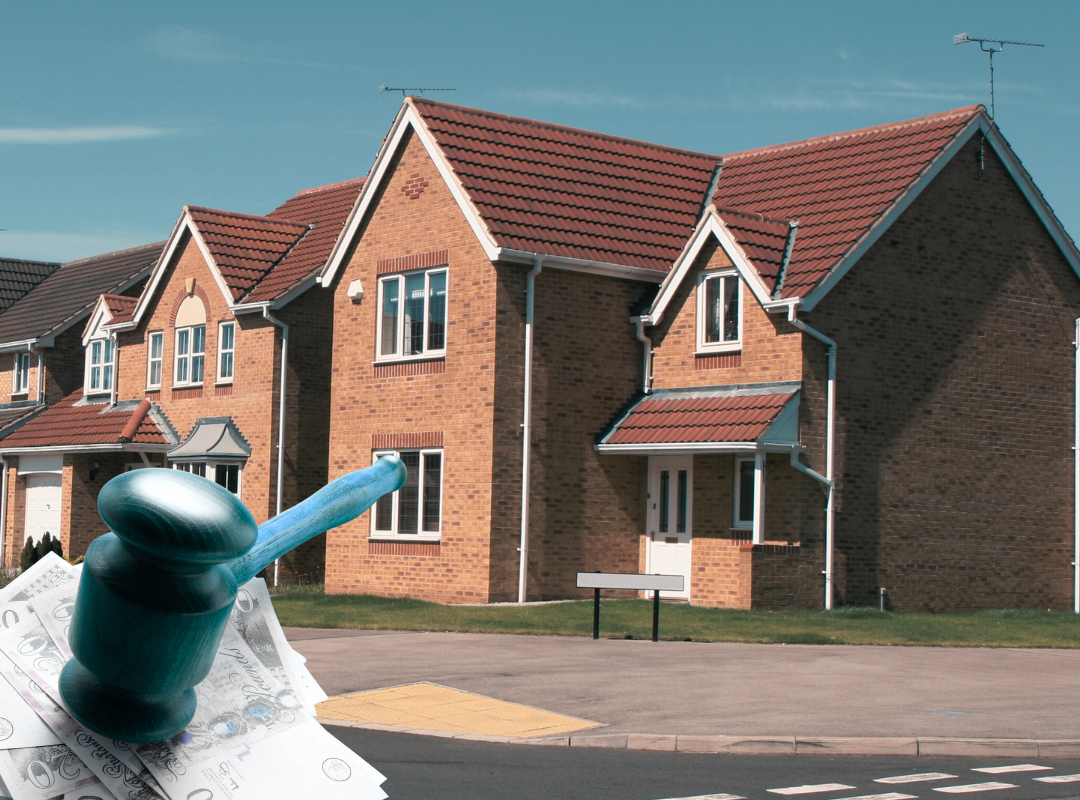Residential auction rooms and online portals have never been busier. Essential Information Group (EIG) logged 28,063 lots sold in 2024, up 10.6 % on the previous year, reflecting the highest annual total since their records began. In the first quarter of 2025, that momentum accelerated, with Auction House offering 1,918 lots – a 14 % jump on Q1 2024. Rising repossessions by lenders in Q4 2024 were 54 % higher than a year earlier.
Many owners rush to auction because a chain sale has collapsed, buyers have lost their mortgage, or urgent debts loom. Yet an auction is not the only fast exit. A cash sale to a professional buyer delivers speed with fewer fees and no hammer fall risk. This article explains why auction figures are spiking, the hidden costs and how a cash sale can offer the same pace with more certainty.
Contents
Why Are More Homes Heading Under the Hammer?
Mortgage stress is rising
UK Finance confirms 1,730 homeowner and buy-to-let properties were repossessed in Q4 2024, an 87 % fall from the 2009 peak but a steep climb compared with the post-pandemic lull. Owners facing arrears often treat an auction as the swiftest way to clear the loan before court action moves forward.
Chains are painfully slow
A typical open-market chain now runs around 185 days from listing to completion. With searches stuck in backlogs and mortgage offers expiring, exhausted vendors choose auctions for a firm 28-day completion – yet a private cash sale can deliver funds even faster.
Price uncertainty pushes sellers to act
Halifax reports a -0.4 % dip in average prices during May 2025, the third fall in four months, which has rattled confidence among owners who missed the 2022 high. Many list at auction, hoping competition will offset a softer market.
Problem properties need specialist buyers
Homes with subsidence, Japanese knotweed or title snags struggle in the traditional market, as “problem properties”. Owner-occupiers rarely have the cash to rectify such issues, but professional investors do.
The Auction Route: Speedy but Pricey
Auctions advertise “fast and final,” yet the process carries charges that reduce net proceeds:

These deductions can wipe out the premium an auction sometimes achieves, especially if only one serious bidder shows up and the hammer falls on the reserve.
Why a Cash Sale Often Wins the Race
A direct cash sale to a regulated buying firm replaces the public auction room with a private contract that still moves at pace:
- Certainty: once a written offer is accepted, a reputable buyer proceeds 100 % of the time, whereas auctions close only 67-70 % of lots.
- Zero seller fees: Many firms pay your legal bill and charge no commission, so every pound on the offer reaches your bank.
- Seven-day completion: Money can be in your account within a week, half the speed of an auction timetable.
- Privacy: A cash sale keeps sensitive circumstances out of Rightmove and the auction catalogue, which can matter in divorce or probate situations.
- Fixed price: With a cash sale, the number you agree on day one is the sum you receive on completion; no last-second bid drop or hammer undershoot.
Because the buyer uses company funds, there is no mortgage lender to satisfy and no survey that might trigger a renegotiation. This single detail explains why owners under time pressure repeatedly choose a cash sale.
Who Typically Chooses a Cash Sale?
- Homeowners facing repossession who need arrears cleared before a court judgment.
- Landlords with rent-arrears tenants who prefer to hand over the problem.
- Executors of dated probate homes are overwhelmed by clearance and repairs.
- Couples splitting assets who value a guaranteed date for financial settlement.
- Investors are pruning portfolios ahead of tax changes or energy-rating deadlines.
All of these sellers calculate that the discount attached to a firm cash sale is smaller than the risk and cost of delay.
A Typical Cash Sale Timeline
Day 1 – Enquiry
Fill a short online form or ring the buyer; share the address, tenure and any known issues.
Day 2 – Offer in Principle
The firm reviews Land Registry data and recent sales, then provides a ball-park number – obligation-free.
Day 3 – One Viewing
A single brief inspection confirms condition; no staging or painting required.
Day 4 – Formal Offer
You receive a written offer, proof of funds and a draft contract; once signed, solicitors are instructed.
Day 7-14 – Completion
The title is transferred, and cleared funds arrive. You choose the exact moving date, giving flexibility that an auction cannot match.
Throughout, the buyer pays the legal fee, so every pound quoted reaches you on the agreed day.
Why Rising Auction Volumes Help Cash Buyers, Too
High catalogue numbers prove that distressed sellers exist in large quantities, and professional cash firms often purchase directly from vendors who had almost listed for auction but stopped once they measured the extra charges. At the same time, investors who buy at auction may later sell certain units to cash-rich firms seeking rental stock, creating a secondary marketplace. In other words, while the headline grabs mention record auctions, the underlying theme is simple: cash buyers are growing in influence because a private cash sale can replicate the speed but deliver with certainty.
Key Takeaways
- Auction sales reached 28,063 lots in 2024, the highest on record.
- Mortgage stress, with repossessions up in Q4 2024, feeds the auction supply.
- The average open-market chain drags on for about 185 days, pushing many to seek faster routes (michaelpoole.co.uk).
- Auction fees – entry, commission, legal pack, buyer’s premium – can consume several percentage points of the hammer price (goodmove.co.uk).
- A cash sale gives a fixed offer, zero seller costs and completion in as little as seven days.
- Owners under urgent time or financial pressure often achieve a higher net figure by choosing a private cash sale over the crowded auction hall.
FAQs
Q1. How much faster is a cash sale than an auction? A reputable buyer can exchange and complete in seven to fourteen days, while an auction fixes completion at 28 days after the hammer falls, and that is after four to six weeks of pre-marketing.
Q2. Will I lose money selling for cash instead of at auction?
Possibly on headline price, but once you subtract auction fees and the risk of a low hammer, the net gap often closes, and the security of a guaranteed cash sale offsets the difference.
Q3. Do cash buyers pay legal costs? Most regulated firms do; always confirm in writing, but it is standard practice in the professional buying sector.
Q4. Can I sell with tenants or probate still pending? Yes. Specialist buyers purchase with tenants in situ and exchange subject to the grant of probate, letting you move forward without.
Q5. How do I avoid scams? Ask for proof of funds, check Companies House registration and read reviews on independent platforms. A genuine buyer responds quickly and never charges upfront fees.
Related articles


